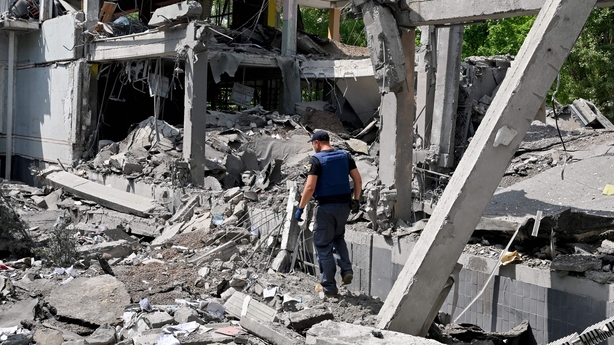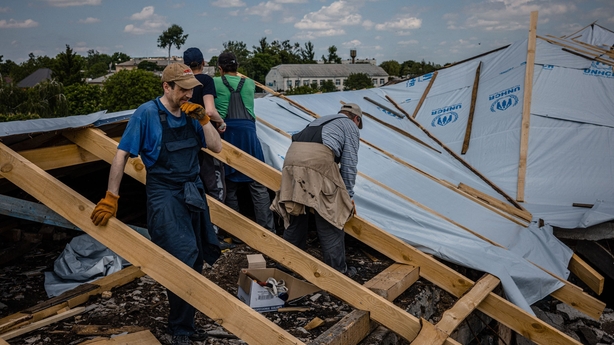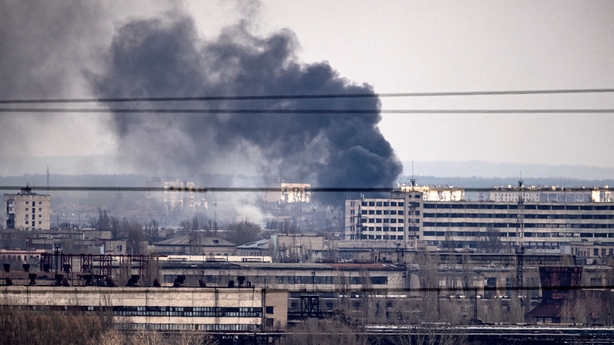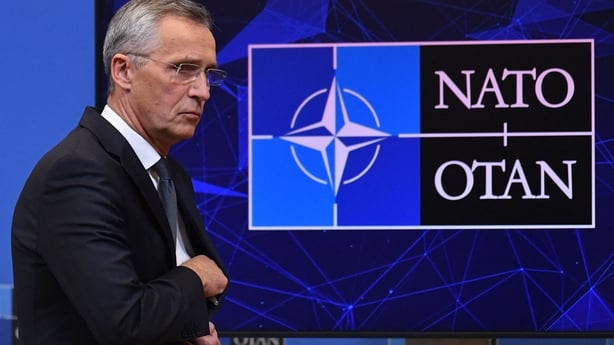Ukrainian President Volodymyr Zelensky has said that Russian forces now control around 20% of Ukrainian territory, on the eve of the 100th day of the invasion.
Russian troops have set their sights on capturing eastern Ukraine since being repelled from around the capital Kyiv, after their invasion began on 24 February.
While their advance has been much slower than Moscow expected, Russian troops have expanded their control beyond the 43,000 square kilometres taken when Russia seized Crimea and parts of the Donbas region in 2014.
"Today, about 20% of our territory is under the control of the occupiers," Mr Zelensky said in a video address to politicians in Luxembourg.
He pleaded for more Western arms to help Ukraine reach a battlefield "inflection point" and prevail in the war, adding that battle lines now stretch more than 1,000km.

The invasion, which enters its 100th day on Friday, has allowed Moscow to capture territory that was "much greater" than the Netherlands, Belgium and Luxembourg combined, added the president.
Ukraine's east is now bearing the brunt of Russia's assault, which Mr Zelensky said was killing up to 100 Ukrainian soldiers every day.
Street fighting was raging in the industrial hub of Sievierodonetsk in Luhansk province, part of the Donbas.
The strategic city is a key target for Moscow which already controls 80% of the area, but Luhansk regional governor Sergiy Gaiday vowed Ukrainian forces would fight "until the end".
We need your consent to load this rte-player contentWe use rte-player to manage extra content that can set cookies on your device and collect data about your activity. Please review their details and accept them to load the content.Manage Preferences
Sievierodonetsk's Azot factory, one of Europe's biggest chemical plants, was targeted by Russian soldiers who fired on one of its administrative buildings and a warehouse where methanol was stored.

Ukraine's armed forces general staff said that besides its assault on the city, Russian troops were also attacking other parts of the east and northeast.
The capture of Sievierodonetsk and its smaller twin Lysychansk would give Russian forces control of all of Luhansk, one of two provinces along with Donetsk in the Donbas claimed by Moscow on behalf of separatists.
Seizing Luhansk would fulfil one of Russian President Vladimir Putin's stated aims and further shift battlefield momentum in Russia's favour after its forces were pushed back from the capital Kyiv and from northern Ukraine.
Moscow's forces were also attempting to advance south towards the Ukraine-held cities of Kramatorsk and Sloviansk, in Donetsk province, provincial governor Pavlo Kyrylenko said.

The war and Western sanctions imposed in response to the invasion are having a massive impact on the world economy. With its control of some of Ukraine's biggest seaports and critical Black Sea shipping routes, Russia has been blocking Ukrainian farm exports and deepening a global food crisis.
Russia and Ukraine together account for nearly a third of global wheat supplies, while Russia is also a key fertilizer exporter and Ukraine a major supplier of corn and sunflower oil.
Signalling a possible breakthrough, Interfax news agency quoted Russia's defence ministry as saying that vessels carrying grain will be allowed to leave Ukraine's Black Sea ports via "humanitarian corridors" with Moscow ready to guarantee their safety.
Ukraine's foreign ministry spokesman, Oleg Nikolenko, earlier said Kyiv was working with international partners on a United Nations-backed solution.
In another sign of the economic stress, Ukraine's central bank hoisted the main interest rate to a seven-year high of 25% from 10% to tackle soaring inflation and shield the hryvnia currency.
Bank governor Kyrylo Shevchenko also said it was time to start talks with the International Monetary Fund on a new economic support programme.
As Washington blacklisted more individuals and entities with ties to the Kremlin, including a major steel producer and a cellist it called Putin's middleman, the European Union gave its final approval to a decision to phase out 90% of Russian oil imports by year-end.
Moscow described the move as "self-destructive", saying it could destabilise global energy markets.

The conflict has also prompted Finland and Sweden to seek NATO membership, though alliance member Turkey has been blocking that move, accusing Stockholm and Helsinki of harbouring people linked to Kurdish militants.
The issue will come up when US President Biden hosts NATO Secretary-General Jens Stoltenberg at the White House.
Russia has said the US is adding "fuel to the fire" with a new $700 million weapons package for Ukraine that will include advanced rocket systems with a range of up to 80km.
Mr Biden hopes extending Ukraine's artillery reach will help push Moscow to negotiate an end to a war in which thousands have been killed, cities and towns flattened and more than 6 million people forced to flee the country.
His administration said it had Ukraine's assurances it would not use the rocket systems to hit targets inside Russia.
"Ukraine is fighting an exclusively defensive war, and we always state this," the country's deputy defence minister Hanna Malyar told a briefing, when asked whether Kyiv made such a promise.
While Moscow denies targeting civilians it says it regards Ukrainian infrastructure transport used to bring in Western arms as a legitimate target.
But it downplayed the effect those supplies will have on what it calls its "special military operation" to disarm Ukraine and rid it of ultra-nationalists the Kremlin says threaten Russian security.
Four Russian missiles hit railway infrastructure targets in two places in the western Lviv region bordering Poland late yesterday, injuring five people and causing significant damage, its governor said earlier.

